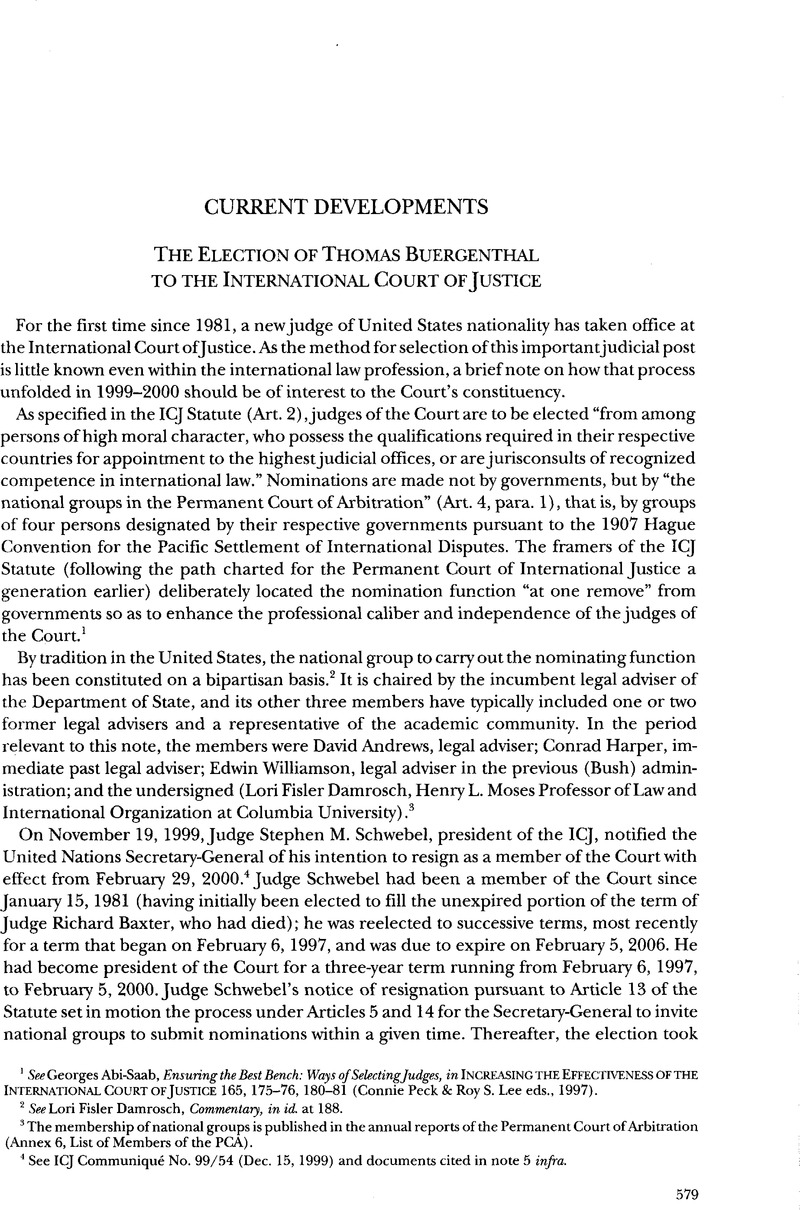Published online by Cambridge University Press: 27 February 2017

1 See Georges, Abi-Saab, Ensuring the Best Bench: Ways of Selecting Judges, in Increasing The Effectiveness of the International Court of Justice 165, 175–76, 180–81 (Peck, Connie & Lee, Roy S. eds., 1997)Google Scholar.
2 See Lori Fisler Damrosch, Commentary, in id. at 188.
3 The membership of national groups is published in the annual reports of the Permanent Court of Arbitration (Annex 6, List of Members of the PCA).
4 See ICJ Communiqué No. 99/54 (Dec. 15, 1999) and documents cited in note 5 infra.
5 See UN Doc. A/54/750-S/2000/105 (2000) (citing Secretary-General’s note of Nov. 24, 1999, to Security Council, UN Doc. S/1999/1197); UN Doc. A/54/751-S/2000/106 (2000) (citing Secretary-General’s note of Nov. 30, 1999, to states parties to ICJ Statute, inviting national groups to submit nominations by Feb. 7, 2000).
6 See SC Res. 1278 (Nov. 30, 1999).
7 Judge Jennings’s resignation became effective on July 10, 1995, and the election was held on July 12, 1995. See 1994–1995 ICJ Y.B. 9.
8 Cf. ICJ Statute Arts. 2–3 (providing that judges be elected “regardless of their nationality,” and that no two judges be nationals of the same state).
9 E.g., Judge Gonzalo Parra-Aranguren of Venezuela was elected in 1996 to fill the unexpired portion of the term of Judge Andrés Aguilar Mawdsley (deceased); Judge Luigi Ferrari Bravo of Italy was elected in 1995 to fill the unexpired portion of the term of Judge Roberto Ago (deceased) Judge Vladlen S. Vereshchetin of die Russian Federation was elected in 1995 to fill the unexpired portion of the term of Judge Nikolai Tarassov (deceased); and Judge Rosalyn Higgins of the United Kingdom was elected in 1995 to fill the unexpired portion of the term of Judge Sir Robert Yewdall Jennings (resigned).
10 This well-established practice resonates with the special role of the Security Council in the election of ICJ judges under the ICJ Statute (Arts. 8, 10, 12). Judges from permanent member states have consistently been elected not only to fill vacancies (as in the cases of Judges Vereshchetin and Higgins referred to in note 9 supra), but also to serve die nine-year terms of the regular elections.
11 The U.S. National Group, as permitted by the Statute (Art. 5(2)), has typically entered nominations for up to four candidates for election or reelection, whether or not a candidate of U.S. nationality was involved. In the regular elections of November 1996, the U.S. National Group (in parallel with a number of other national groups) nominated Judge Schwebel, as well as Judge Vereshchetin of the Russian Federation. Most recently, for the November 1999 regular elections, the U.S. National Group nominated (in parallel with other national groups) Judges Gilbert Guillaume and Rosalyn Higgins for reelection. See List of Candidates Nominated by National Groups: Note by the Secretary-General, UN Doc. A/51/334-S/1996/723 (1996); UN Doc. A/54/306-S/1999/940 (1999); Consolidated List of Candidates Nominated by National Groups, UN Doc. A/54/306/Rev.1-S/1999/940/Rev.1 (1999).
12 ASIL Committee on ICJ Nominations, Principles Concerning ASIL Advice on Nomination and Election of ICJ Judges and of Other Internationally Elected Jurists, reprinted in ASIL Newsl., Jan.-Feb. 1997, at 3 Google Scholar; see also Brower, Charles N., Notes from the President, ASIL Newsl., Sept.-Oct. 1996, at 1 Google Scholar.
13 Schachter, Oscar, The Invisible College of International Lawyers, 72 Nw. U. L. Rev. 217 (1977)Google Scholar.
14 Damrosch, supra note 2, at 193–94 (footnotes omitted).
15 See UN Docs. A/54/751-S/2000/106 & Adds. 1, 2 (2000) (recording nominations of Buergenthal by 17 national groups). No other names were submitted by any national group.
16 The recorded vote in the General Assembly was 117 in favor, 7 abstentions, and 0 against. See UN Press Release GA/9700 (Mar. 2, 2000). The electors in the General Assembly are all 188 UN member states together with the one non-member state (Switzerland) that is a party to the Statute of the Court. Id.; see also ICJ Statute Art. 4(3). Procedures for the conduct of the parallel ballots are set forth in UN Doc. A/54/750-S/2000/105, at 3–5 (2000).
17 See Verbatim Record at Opening of Hearing in Aerial Incident of 10 August 1999 (Pak. v. India), obtainable from<http://www.icj-cij.org (Apr. 3, 2000).
1 For a general description of the Sixth Committee and its role in the progressive development and codification of international law, see Morris, Virginia & M.-Christiane, Bourloyannis, The Work of the Sixth Committee at the Forty-seventh Session of the UN General Assembly, 87 AJIL 306, 306 nn.1, 2 (1993)Google Scholar.
2 As discussed below, there was a vote on one of the draft resolutions concerning international terrorism and on a paragraph of the draft resolution on the ILC topic. For an extensive summary of the debate and the action taken by the committee with respect to the various items, see UN Docs. A/C.6/54/SR. 1–37 (1999–2000). For the draft resolutions recommended by the Sixth Committee after the debate, all of which were adopted by the General Assembly without change, see the Sixth Committee’s reports to the General Assembly on the various items, UN Docs. A/54/607–16 (1999) (also containing information on relevant documentation, including summary records, for each item); see also GA Res. 54/27–28 (Nov. 17, 1999), GA Res. 54/101–12, GA Dec. 54/429 (Dec. 9, 1999), obtainable from <http://www.un.org/law/cod/sixth/54/sixth54.htm. For further information and documentation on the committee’s work at the 54th session, see id.